- Home
- Michael McDowell
Jack and Susan in 1913 Page 3
Jack and Susan in 1913 Read online
Page 3
Mr. Austin sent flowers. Mr. Austin sent her notes. Mr. Austin went to her doctor and said that he would be responsible for all charges incurred by Miss Bright’s confinement in the hospital.
Susan blushed with shame when she heard this, and hastened to inform the doctor that she would pay all the fees. Single women did not accept money from strange gentlemen.
Susan fretted in the hospital. The days were long and tedious. The old woman in the bed on one side of her was alternately nonsensically garrulous and comatose. The young woman in the bed to her other side insisted on Susan’s reading aloud to her all the serial stories out of the past year of Cosmopolitan magazine. Susan got her fill of the improbable inanities of such sagas as “Virginia of the Air Lanes.”
She estimated that this stay in the hospital, which the doctor said would be about two weeks, would cost her about one hundred dollars, which represented exactly two-thirds of her scanty Wall Street cache. That left her less than sixty dollars to live on for the next two months—the amount of time, the doctor also said, she would have to spend at home recuperating.
Fifty dollars was not enough. It would give her a weekly allowance of about six dollars, and her rent was three dollars a week. That left three dollars for such incidentals as food, firewood, clothing, and transportation. Then, even supposing that she did make do on this fifty dollars and that her leg healed properly and with miraculous swiftness, what then?
To live she’d be absolutely dependent on her income, and stage jobs were not easy to come by. It had, after all, been a long while between the fan-waving of Cleopatra and the syrupy love-swooning of He and She. Why, oh why hadn’t she simply gone home directly after the opening of the play? Why had she ever read the note that Mr. Austin had sent her? Why hadn’t she listened to Ida’s warnings? Why hadn’t she allowed that unfortunate dog to drive her admirer away?
It wasn’t his fault, she knew that. But when Susan conjured up and execrated Malign Fate, Malign Fate possessed Mr. Austin’s shadowy features and hoarse voice.
Yet even with her constant refusals to see him when he visited the hospital—at least every other day—Susan was somehow disappointed when she received a final-sounding letter from him.
January 20, 1913
My dear Miss Bright,
I know that you will not be displeased to hear that I am going away from this city. My financial guardian and advisor has interests in Chicago, and has asked me to oversee some difficult transfers of properties and holdings. If I had any hope that I might be of use to you, I would refuse to go, but as my presence here provides you no comfort, and seems only to irk you, I have acquiesced to his wishes. I start west this evening. If I may ever be of assistance to you in any fashion, please do not hesitate to write to me in care of the American Exchange National Bank, No. 37 Wall Street.
Sincerely yours,
Jay Austin.
It was with a heavy heart that Susan Bright returned, in a taxicab, to her apartment building—the somewhat grandiosely named Fenwick—on West Sixtieth Street.
It was with great discomfort and difficulty that she trudged up the stairs to her rooms on the fourth floor. The plaster cast on her right leg was heavy and stiff, and threw her off-balance. The cast was completely hidden by her long skirt, but she wobbled along like a cripple—the object of pity of passersby on the street. Even before she’d reached home, she’d decided she would try to make trips down to the street as infrequently as possible.
It was with no hope in her heart that she anticipated twelve weeks in those two rooms on the fourth floor, looking out at the street for hours on end. While her purse dwindled, and her leg healed, life would pass her by more fleetingly than ever.
But then, with her key in the lock of the door, it was with considerable surprise that she heard a high-pitched bark of a dog on the other side.
Her heart sank with the conviction that she’d been turned out of her home; that some party willing to pay a higher rent had taken over.
She turned the key, twisted the knob, and steeled herself to greet unfamiliar faces, see different furniture.
Where would she go now? Where—
The furniture was the same, dustier than she usually allowed it to get, but the same.
No one was there.
No one, that is, except a small white terrier, which despite the wooden leg strapped to its hindquarters, managed to leap into the air at her in the open doorway.
She grabbed him and held him close. The dog squirmed and slathered away happily at the tears that welled in Susan’s eyes.
CHAPTER FOUR
SUSAN BRIGHT (fourth-floor front) had a downstairs neighbor, Hosmer Collamore (third-floor back). Mr. Collamore worked as a moving picture cameraman at the Cosmic Film Company, situated in a warehouse near Madison Square. Often, in the past, Susan and Hosmer had found themselves leaving the building together, or traversing the hallways at the same time. The apartment building’s only telephone was outside the door of Hosmer’s room, so when Susan received calls, it was Hosmer’s habit to alert her with a rap at the door. In short, they had always enjoyed what was called an apartment house intimacy, but Susan suspected that Hosmer would have been pleased to make it as deep and real an intimacy as the other dwellers of the building undoubtedly suspected it was.
Late in the afternoon of her arrival home, Susan sat at her open door, listening for the sound of her neighbors coming in from work. When she heard a masculine tread on the floor below, she called out, “Mr. Collamore? Hosmer?”
“Miss Bright? Susan?”
Apartment house intimacy wavered between polite and familiar forms of address, but after a few minutes, conversation generally evolved into the latter.
Hosmer Collamore presented himself forthwith. He actually kissed Susan’s hand in welcoming her back. His smile was full of melancholy sympathy and interest in her injury.
Hosmer was darkly handsome, though not much taller than Susan herself. His cheek was swarthy and he wore a thick black mustache that he combed and treated with a sweet-smelling pomade. His hair was nearly as black as Susan’s, though his was wavy. But most striking were his dark brown eyes, with lashes so thick and black that they almost looked as if they were blackened with kohl. He was spruce and neat, and although a West Sixtieth Street address generally indicated a modest income, Hosmer always dressed in the style of the quite well-to-do. The impression that Hosmer made on Susan was probably not as masculine, not as positive, and not as alluring as he would have liked to imagine.
Susan held the terrier in her arms, lest he attack Hosmer, but the dog squirmed loose and flew toward the cameraman. Susan opened her mouth to scream, but to her amazement Hosmer just laughed and picked up the dog—and presented his face to be licked.
The dog barked in obvious affection, and dug his wooden leg into—and through the seam of—Hosmer’s waistcoat pocket.
“This dog, Hosmer. Have you any idea how he came to be in my apartment?”
“I put him here,” said Hosmer. He had lived on Manhattan Island some years now. His accent, however, clung to its Brooklyn roots.
“But—”
“How did I come by this particular animal, you mean to ask?”
“Yes?”
“A couple of days ago a policeman brought him by and said he belonged to the young lady on the fourth floor. He already knew you were in the hospital.”
Susan shook her head, auguring that this animal had found its way back to her through the unacknowledged agency of Jay Austin.
The dog’s missing leg made her think hard about her own injury, and she now fully realized that hers could have been considerably worse. After all, her cast would eventually come off, and there might not be a limp. But this poor animal would scrape along for the rest of his life on three legs and a tapered wooden stick. Pad pad pad tap. Pad pad pad tap.
“What do you call him?” asked Susan.
Hosmer laughed. “What do you call him? He is your dog, I presume.”
&nbs
p; Susan shrugged. Hosmer’s occupation as a cameraman occurred to her and she said, “With only three legs I suppose his name must be Tripod.”
Near-total invalidism was not a pleasant state for Susan Bright. She was used to activity—even if it was usually not much more than going from theater to theater throughout the city trying to find work. But Tripod proved to be great company, for he was an intelligent—if volatile—dog. And Hosmer visited every morning before he went off to work, and dropped by every afternoon when he returned. Susan was grateful for these visits, for sometimes Hosmer was the only human being she spoke to in the course of the day. He ran errands for her as well, so that she was not often put to the necessity of going out. This was a good thing, for she’d been told that the more time she spent in bed, the sooner she’d be up and out of it. She borrowed stacks of magazines from Mrs. Jadd across the hall—McClure’s, McCalls, Cosmopolitan, Woman’s Home Companion, The Modern Priscilla—and read them cover to cover.
Two weeks passed, and Susan grew proficient with the use of her crutches. She was now able to scurry about her two rooms with energy and dexterity that almost matched Tripod’s. The weather was wretched and streets were piled with snow one day and awash with slush the next. She did not venture out. The possibility of filling her cast with frigid water was unpleasant indeed. Meanwhile her small money supply dwindled. The hospital and doctor’s fees were higher than she’d anticipated, nearly one hundred and twenty dollars, and that had left her only forty—and that forty had rapidly dwindled to twenty-five, and now, in the first week of February, was down to eleven dollars and twenty-three cents.
If Susan had been prone to misery, she now would have been miserable indeed. Her whole life felt crippled. Even her dog didn’t have a full complement of limbs.
Pad pad pad tap. That was Tripod.
Slap clunk. Slap clunk. That was Susan Bright, with a worn slipper on one foot and a thirty-pound cast on the other.
Her entire life was confined to the narrow circumference of two rooms on West Sixtieth Street, with a frigid rain beating against the window and the landlady hanging about the front stoop, just waiting for the tenth of the month so she could come up the stairs and knock on the door of fourth-floor front and demand twelve dollars—which Susan Bright didn’t have.
Pad pad pad tap.
Slap clunk. Slap clunk.
She had received another letter from Mr. Austin, postmarked Chicago. He had urged her to call upon his bankers in Wall Street should she find herself short of funds. He asked permission to continue to write to her. He begged for a reply, even if it were only a postal card with the single word “Yes” on it.
Susan sent back a post card with a tinted picture of Ida Conquest as the Aeroplane Girl. On the half of the card reserved for messages, Susan penned the single word “No.”
Susan Bright hadn’t done what she’d done for all these years, and struggled as she’d struggled, to give up all her hard-bought pride and independence to the casual generosity of a stranger. Oddly, the nearer Susan got to destitution, the stronger her resolve never to take Mr. Austin up on his offer.
So she heard no more from her admirer in Chicago, but the two letters from him lay unfolded in the top drawer of her dresser, and sometimes she would inadvertently catch sight of them.
One day, which had offered the prospect of being no different from all the rest, ended with a surprise for Susan. At half-past six came Hosmer’s expected and characteristic knock at the door.
She swung herself to the door on her crutches, opened it and was astonished to see that Hosmer was not alone. Standing beside him, in an outfit that would have made her seem quite at home on the stage of a variety hall doing a turn entitled, “The Glorification of Girl,” was Ida Conquest. Her black-and-white striped dress had huge gold cuff buttons, and was adorned with a “beauty pin” the size of a lemon. Both wrists were draped with gold bangles, and she wore a black hat decorated with not only a white feather, but also with a hatpin with a butterfly cap. Susan remembered Ida had once been a ribbon clerk, and now she looked like a ribbon clerk’s apotheosis of feminine allure.
Ida Conquest was the last person in the world from whom Susan had expected a visit.
Ida gazed over Susan’s shoulder into the apartment with a hard eye, then she glanced at Hosmer Collamore with an equally stony gaze as if to convey a message to Susan on the order of, This is a conductor, not a companion, then she dropped her disapproving gaze to Tripod, who was scratching his chin with the tip of his wooden leg. Then she said, with the lisp that reviewers managed to find at once charming and incomprehensible, “I’ve heard your limp is quite the most pathetic thing in New York.”
“Won’t you come in, Ida?”
There is only one course to take with people like Ida Conquest, and that is to treat them with absolute civility and courtesy, no matter how much you’d like to fly at them with a fistful of sharp objects.
Susan would not ask how Ida, who preferred her masculine company to be moneyed and well-placed even before they were handsome, had come to be with Hosmer. Susan had at first supposed that the two had simply met outside her door, but Hosmer’s gloating smile said plainly enough that he had succeeded scraping acquaintance with the Aeroplane Girl.
“Won’t you take a chair?” Susan said politely to her guests.
“Thank you. I’ll stand by the window,” Ida said, in a manner suggesting that being splashed with cold rainwater was preferable to possible contamination by Susan’s upholstery.
“Ida has agreed to appear in several Cosmic Film productions,” said Hosmer giddily.
Susan glanced sharply at Ida. Ida turned away, perhaps to conceal a blush. When she turned back, she amended, “Under the most favorable terms of course.”
Acting in moving pictures was considered a come-down for stage actors; it was thought of as nothing but a caricature of real acting. Gentlemen and ladies of the stage who had lost their voices through accident or disease were excused, but an actor who left the legitimate boards for the grimy moving-picture factories relinquished not only self-respect but the sympathy of other thespians. Better to hack along in a third-rate touring company on the Omaha-Kansas City-Peoria circuit than to prostitute oneself in front of a grinding camera, an opinion Susan had often heard Ida express.
“He and She closed,” said Ida.
“So I read.”
“And Mr. Fane pursued me with stupendous offers.”
“Junius Fane is president of the Cosmic Film Company,” explained Hosmer.
“Mr. Fane thinks that my face and talents are ideally suited for moving pictures,” said Ida. “Mr. Fane promises me also that I will be very rich. I am to be known as the ‘Cosmic Star.’”
“Ida’s photograph will appear in the next number of the Clipper,” said Hosmer, referring to New York’s preeminent sporting and theatrical paper. It was read principally by gentlemen smoking cigars in barbershops, and gentlemen smoking cigars at the races.
Susan was amused not only by Ida’s meretricious change of opinion on the subject of the moving pictures, but also on Hosmer’s evident infatuation with the new Cosmic Star. It had been obvious to Susan in recent weeks that Hosmer had been forming an attachment to her, and she’d rather dreaded the time when she would have to call a halt to that. But now she could see that her place in Mr. Collamore’s shallow affections had been usurped by Ida Conquest.
“Ida takes wonderfully,” said Hosmer.
“Takes?”
“She looks splendid on celluloid, I mean. That’s what I mean by ‘she takes wonderfully.’”
“Will the Cosmic Star take tea?” Susan asked.
“Yes,” replied Ida. “I will.”
Slap clunk went Susan to her little cubbyhole of a kitchen where a tiny gas flame could warm a pan of water after perhaps a quarter of an hour of diligent effort.
The good tea was on the top shelf, out of harm’s way, and Susan couldn’t very well reach it.
“Tripod,” she cal
led.
Pad pad pad tap came Tripod to the kitchen. Susan snapped her fingers and the dog leapt into her arms. Susan held the dog aloft and Tripod snagged the small canister in his teeth.
Ida and Hosmer remained just long enough to be served their tea, though not to drink it.
“It’s terrible to think you won’t never find work again,” Ida said. “Not on the stage anyhow. And not anywhere else where people will have to look at your gimp leg. What will you do, do you think, Suss?”
Suss rhymed with caboose, and Susan hated it when anyone called her by that detestable nickname. Glancing at Hosmer, she realized with a sinking feeling that he would probably call her by that repulsive syllable forever after.
“I’ll manage,” said Susan brightly. “I’ve gotten along pretty well up till today, and I don’t foresee that tomorrow will be much different.”
Oh, but tomorrow looked fairly bleak when Susan closed the door on the Cosmic Star and her worshipful astronomer. Because tomorrow the rent came due, and Susan was short thirty-seven cents. Thirty-seven cents was very little when it was a surplus, but when you lacked that sum, it could seem to be a very great deal of money indeed.
Even supposing that—in this extremity—she took to her crutches and went out on the street and begged in the name of her broken leg and her dog’s infirmity and got the thirty-seven cents to make up the difference, what would happen after that?
Firewood, and even cheap tea, and the electricity that burned feebly inside the tiny glass globes in the wall sconces—these weren’t things that came to West Sixtieth Street without payment.
Susan knew what happened to young women in 1913 who found themselves without work, without income, without relatives to apply to for assistance. The timid applied for charity, but were turned away because their clothes were too fine. So they pawned their clothes, and then were too ashamed to be seen on the street. The industrious and honest took in sewing and ruined their eyes. All these got by on less food than formerly, and on no pleasure at all. The brazen and the forward (and, probably, more intelligent) young women became—what was that dreadful phrase?—nymphs du pave. But women who made their living on the streets at the very least could dress warmly and have enough to eat. There was a great deal to be said for not starving or freezing to death. Perhaps there would come a time when the unfortunate and the destitute were not simply swept into the gutters of the city streets, when provision was made for the homeless, for those unable to find work, for the permanently invalided. But that time was not now, and Susan knew that without assistance, she would sink.

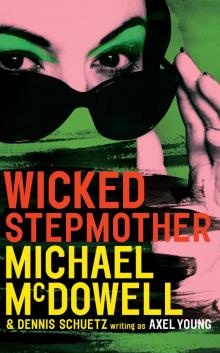 Wicked Stepmother
Wicked Stepmother Blackwater: The Complete Caskey Family Saga
Blackwater: The Complete Caskey Family Saga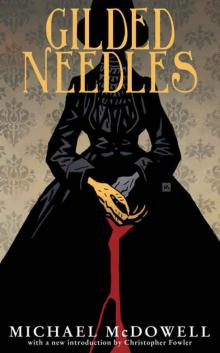 Gilded Needles (Valancourt 20th Century Classics)
Gilded Needles (Valancourt 20th Century Classics)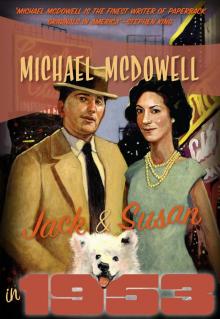 Jack and Susan in 1953
Jack and Susan in 1953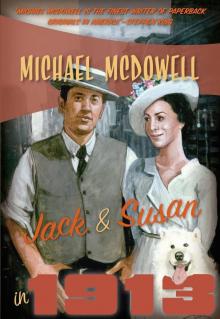 Jack and Susan in 1913
Jack and Susan in 1913 Rain
Rain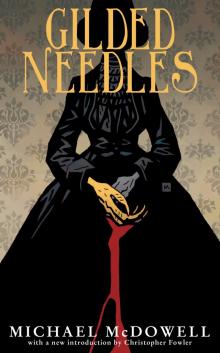 Gilded Needles
Gilded Needles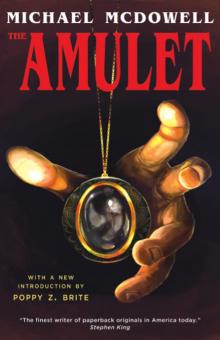 The Amulet
The Amulet Cold moon over Babylon
Cold moon over Babylon The Elementals
The Elementals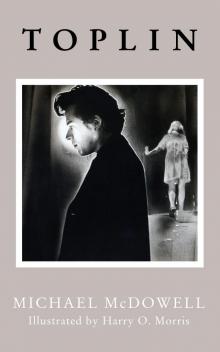 Toplin
Toplin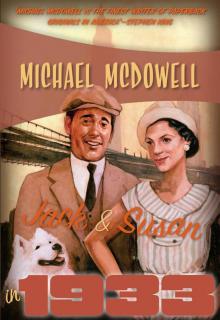 Jack and Susan in 1933
Jack and Susan in 1933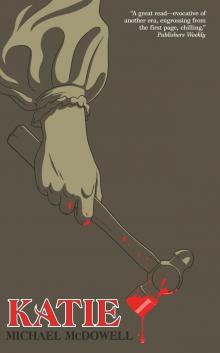 Katie
Katie The Valancourt Book of Horror Stories
The Valancourt Book of Horror Stories